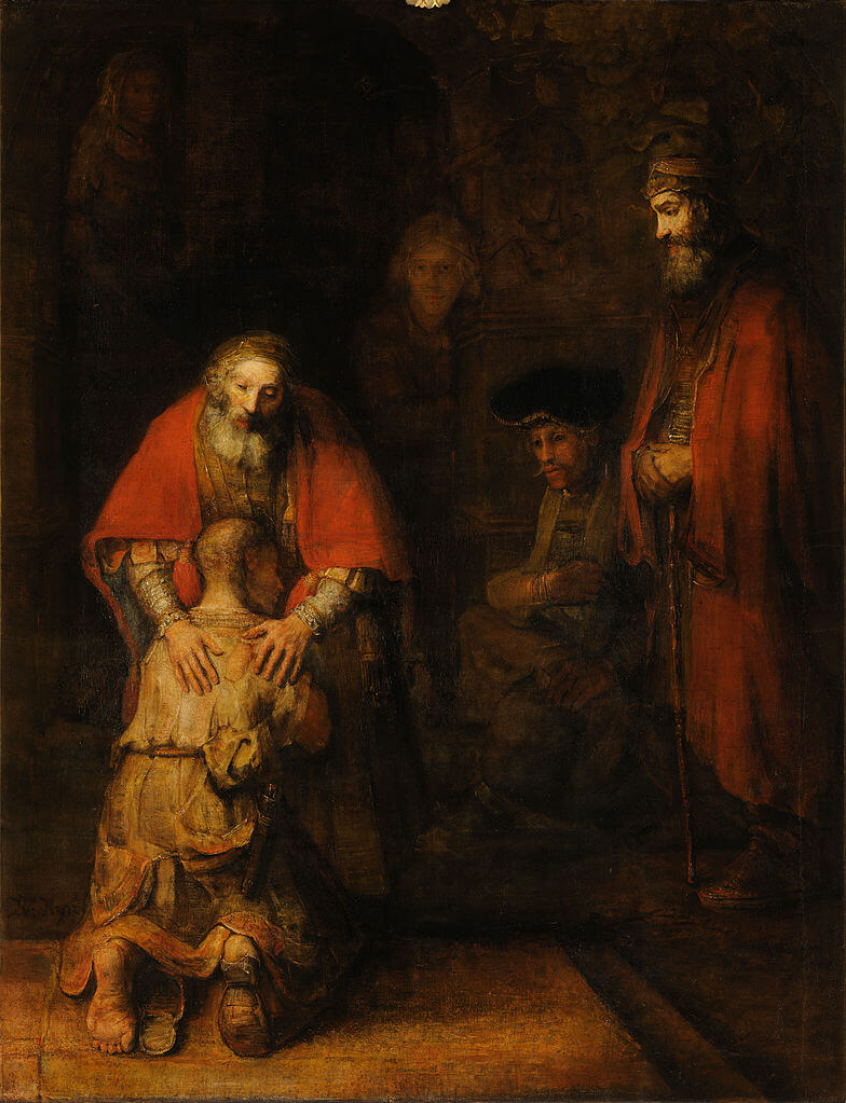
It's one of the most famous and familiar stories in the Bible, if not all of literature. Jesus' parable of the Lost or 'Prodigal' Son, who squanders his father's fortune on a whim, and returns with his tail between his legs to discover that his long-suffering dad is somehow still pleased to see him. It's a beautiful picture of unconditional parental love, and more significantly of the grace of God.
It has also inspired huge amounts of art and cultural response through the centuries, from famous baroque paintings to Legends of the Fall. But in our familiarity with the story, I wonder if we miss a whole host of interesting elements that would have been understood by Jesus' original audience. Is it possible that despite all the times we've heard it, there are still many things that we don't understand about the parable of this Lost Son? Here are just a few examples of what I mean:
1) This story is unprecedented
The account of the story in Luke 15:11-32 gives us much less narrative than we might imagine, especially as Jesus sets up the story. All we get by way of introduction is "There was a man who had two sons. The younger one said to his father, 'Father, give me my share of the estate.' So he divided his property between them." (v11-12). In 2016, this might just be seen as extremely rude, or an innovative workaround for inheritance tax. But in the cultural context, this was totally extraordinary and without precedent. In his incredible book Poet and Peasant, cultural studies guru Kenneth Bailey writes that:
"To my knowledge, in all of Middle Eastern literature (aside from this parable) from ancient times to the present, there is no case of any son, older or younger, asking for his inheritance from a father who is still in good health."
Quite simply, this didn't happen. And not only that, it hasn't even happened since. Younger sons aren't even meant to inherit the family estate anyway – and yet this one impertinently asks for half, and receives it.
2) The son is wishing death upon his father
Again, in a modern context we miss the total outrageousness of the son's request. Since such a transaction would only ever take place when a father was about to die and could no longer head the family or its business, the son is effectively saying to his father "I wish you were dead." This has been confirmed by those hearing the story for the first time in a Middle East context, time and again. The son's request heaps shame upon his family, and particularly on his father who has raised this arrogant and self-centred child, but it also brings enormous grief to the older man, who is effectively told "you are dead to me now" by his son.
3) Jesus' original audience would have been going crazy.
We might imagine ol' meek-and-mild Jesus telling this story to a group of mild-mannered folk on a hillside somewhere, in reality his storytelling would have been much more rowdy and interactive. We read the text so quickly; in fact he'd have had to pause regularly to accommodate the gasps and shouts of incredulity from his original audience. The crowd would have been incandescent with rage at the behaviour of the son, full of schadenfreude at what happens to him next, and baying for his blood as the finale approached.
4) That pig-herding thing was never meant to actually happen
Another fascinating cultural insight from Kenneth Bailey reveals that the prodigal's descent from party animal to animal welfare officer was never an intended outcome. The citizen of the far country to whom the son attaches himself is actually trying to get rid of him with the pig herding offer. Bailey writes: "The text tells us graphically that he 'glues' himself to a citizen of that country. This lad is known in the community as having arrived with money and thus is expected to have some self-respect left. The polite way a Middle-Easterner gets rid of unwanted hangers-on is to assign them as task he knows they will refuse... However, the pride of the prodigal is not yet completely broken, and so to the amazement of the listener, the citizen's attempt to get rid of the younger son fails. He accepts the job of a pig herder." In his attempt to retain control of a situation that has gone very badly wrong, the prodigal convinces himself that he can still win by working his way back up from the very bottom. Jesus' original audience would have been rolling around with laughter at this.
5) The prodigal wasn't really repentant as he turned for home
Eventually the son realises that he's going to starve to death, and it's this realisation, rather than actual repentance, which drives him to leave the farm and travel back to his father's village. We know this because of the difference between what he plans to say (v18-19), and what he actually says when he's confronted with the compassion and grace of his dad (v21). He leaves out the offer of working as a hired servant, because he instantly realises that the father's grace covers any need to try to work his way back into the family. He set off still trying to control and manipulate the situation, but when he saw his father's love, he finally surrendered that control.
6) The father didn't just run because he was joyful...
For an elderly man to run in this culture was extremely unusual and very humiliating; Aristotle writes simply that: "Great men never run in public." Yet the father runs, and not just because he is "filled with compassion." In that culture, a Jewish son who lost his inheritance among gentiles would have been subject to a ceremony on his return to the village called the kezazah, in which the villagers would have broken a large pot at his feet and yelled at him, telling him that he was now cut off from his people. So when the father runs, it's at least partly because he wants to reach the son before the rest of the village can get to him. He is literally running to save him. Instead of subjecting him to the utter shame of the kezazah, he embraces him, shows the village that his son is forgiven, and then moves to quickly restore him through the killing of the fattened calf – another moment that would have had the audience's heads spinning. The entire village would have attended a feast that night, and the son would have been publicly restored – the son who was dead, made alive again.
We've not even had time to mention the story of the other son, who perhaps understandably feels aggrieved at his brother's restoration, or the situation of this parable among two other stories of the lost being found. A cultural studies approach provides a wonderful insight into the depth and brilliance of Scripture; and perhaps it should inspire us to dive deeper into the text at every opportunity. In this case, learning the extraordinary significance of the son's outrageous request and the father's even-more-outrageous response helps us to understand in a new way just how wide, deep and extraordinary is the love of God.
Martin Saunders is a Contributing Editor for Christian Today and the Deputy CEO of Youthscape. Follow him on Twitter @martinsaunders.













